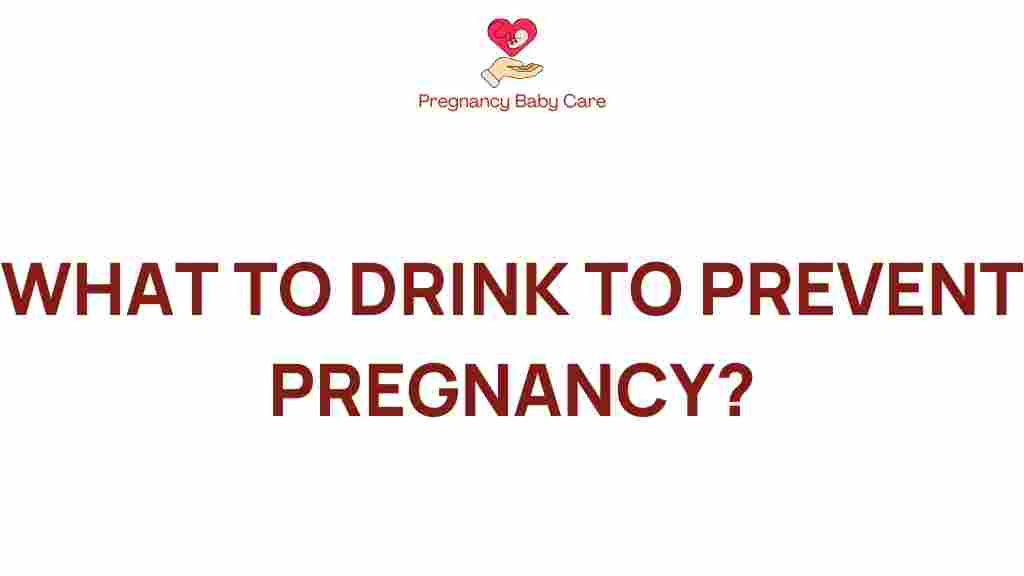Uncover the Secrets: What to Drink to Prevent Pregnancy?
When it comes to women’s health and reproductive choices, there are numerous options available for contraception. While traditional methods like birth control pills and condoms are commonly discussed, many may wonder about the role of beverages in the realm of fertility and pregnancy prevention. In this article, we will explore various drinks that have been suggested to help prevent pregnancy, the science behind them, and how they fit into the broader context of contraception and women’s health.
Understanding the Connection Between Beverages and Contraception
While no drink can guarantee 100% prevention of pregnancy, certain beverages may influence fertility and reproductive health. It is crucial to understand that hydration plays a vital role in overall health, including reproductive health. Staying well-hydrated can support your body’s natural functions, potentially affecting your fertility and menstrual cycle.
The Role of Hydration in Women’s Health
Proper hydration is essential for maintaining balance in the body. For women, hydration can impact hormonal balance, menstrual cycles, and overall reproductive health. Here are some key points to consider:
- Water supports the transportation of nutrients and oxygen to cells.
- Hydration helps in regulating body temperature and maintaining healthy skin.
- Drinking enough fluids can help regulate your menstrual cycle.
Incorporating specific beverages into your daily routine can support your body’s needs and might influence your reproductive choices.
Safe Drinks that May Help Prevent Pregnancy
While no drinks can replace safe contraception methods, some beverages are worth considering for their potential benefits:
- Pineapple Juice: Rich in bromelain, it may help support hormonal balance.
- Green Tea: Contains antioxidants and may support weight management, influencing hormonal health.
- Ginger Tea: Known for its anti-inflammatory properties, it may help with menstrual pain and hormonal balance.
- Red Clover Tea: Traditionally used to support reproductive health and hormonal balance.
- Spearmint Tea: May help lower testosterone levels in women and support hormonal balance.
Step-by-Step Process: Incorporating Beverages into Your Routine
If you are interested in using beverages as part of your approach to prevent pregnancy, here’s a step-by-step guide:
- Consult with a Healthcare Provider: Before making any changes, discuss your plans with a healthcare provider to ensure they fit your health needs.
- Choose Your Beverages Wisely: Select drinks that are known for their potential benefits in supporting hormonal balance and overall health.
- Hydration Goals: Aim for at least 8-10 glasses of water daily, and include herbal teas or natural juices in moderation.
- Monitor Your Body’s Response: Pay attention to how your body reacts to the changes in your diet. Look for improvements in energy levels, menstrual regularity, and overall health.
- Adjust as Necessary: If a particular drink doesn’t seem to benefit you, feel free to switch it up. Listen to your body.
Potential Troubleshooting Tips
As you incorporate these beverages into your routine, you may encounter some challenges. Here are some troubleshooting tips:
- Digestive Issues: If you experience upset stomach or digestive discomfort, try reducing the quantity or frequency of certain herbal teas.
- Allergic Reactions: Always check for allergies before trying new herbal drinks. If you have a reaction, discontinue use immediately.
- Hormonal Fluctuations: Keep track of your menstrual cycle and any changes you notice. If irregularities occur, consult your healthcare provider.
Conclusion: Making Informed Choices
While beverages can play a supportive role in women’s health and may influence factors related to fertility, they should not be viewed as standalone solutions for preventing pregnancy. Always prioritize proven contraception methods and consult with a healthcare professional about the best options for your individual needs.
By understanding the relationship between hydration, beverages, and reproductive health, you can make informed choices that align with your goals. Remember, safe drinks and a balanced diet are integral parts of a healthy lifestyle, contributing to overall well-being.
For more information on women’s health and reproductive choices, you can visit this resource.
To learn more about contraception methods, check out this article.
This article is in the category Pregnancy and created by PregnancyBabyCare Team
